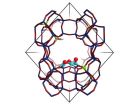(Press-News.org) This news release is available in German.
A new bio-inspired zeolite catalyst, developed by an international team with researchers from Technische Universität München (TUM), Eindhoven University of Technology and University of Amsterdam, might pave the way to small scale 'gas-to-liquid' technologies converting natural gas to fuels and starting materials for the chemical industry. Investigating the mechanism of the selective oxidation of methane to methanol they identified a trinuclear copper-oxo-cluster as the active center inside the zeolite micropores.
In an era of depleting mineral oil resources natural gas is becoming ever more relevant, even though the gas is difficult to transport and not easily integrated in the existing industrial infrastructure. One of the solutions for this is to apply 'gas-to-liquid' technologies. These convert methane, the principal component of natural gas, to so-called synthesis gas from which subsequently methanol and hydrocarbons are produced. These liquids are then shipped to chemical plants or fuel companies all over the world.
This approach, however, today is only feasible at very large scales. Currently there is no 'gas-to-liquid' chemistry available for the economical processing of methane from smaller sources at remote locations. This has spawned many research efforts regarding the chemistry of methane conversion.
Of all the conceptually promising smaller scale processes for the direct conversion of methane, the partial oxidation to methanol seems the most viable since it allows for lower operating temperatures, making it more inherently safe and more energy efficient.
Bio-inspired catalyst
A research team combining the expertise of Moniek Tromp (UvA/HIMS), Evgeny Pidko and Emiel Hensen (Eindhoven University of Technology), Maricruz Sanchez-Sanchez (Technische Universität München) as well as Johannes Lercher (Technische Universität München and Pacific Northwest National Laboratory) is currently focusing on a bio-inspired method enabling such partial methane oxidation.
At the focus of the team is a modified zeolite, a highly structured porous material, developed at Lercher's research group in Munich. This copper-exchanged zeolite with mordenite structure mimicks the reactivity of an enzyme known to efficiently and selectively oxidize methane to methanol.
In their actual publication in Nature Communications the researchers provide an unprecedented and detailed molecular insight in the way the zeolite mimics the active site of the enzyme methane monooxygenase (MMO).
Highly selective
The researchers show that the micropores of the zeolite provide a perfect confined environment for the highly selective stabilization of an intermediate copper-containing trimer molecule. This result follows from the combination of kinetic studies in Munich, advanced spectroscopic analysis in Amsterdam and theoretical modeling in Eindhoven. Trinuclear copper-oxo clusters were identified that exhibit a high reactivity towards activation of carbon-hydrogen bonds in methane and its subsequent transformation to methanol.
"The developed zeolite is one of the few examples of a catalyst with well-defined active sites evenly distributed in the zeolite framework - a truly single-site heterogeneous catalyst," says Professor Johannes Lercher. "This allows for much higher efficiencies in conversion of methane to methanol than with zeolite catalysts previously reported."
Furthermore, the research showed the unequivocal linking of the structure of the active sites with their catalytic activity. This renders the zeolite a "more than promising" material in achieving levels of catalytic activity and selectivity comparable to enzymatic systems.
INFORMATION:
The research was funded by the U.S. Department of Energy, Office of Basic Energy Sciences, Division of Chemical Sciences and the EU NEXT-GTL (Innovative Catalytic Technologies & Materials for Next Gas to Liquid Processes) project. The XAS measurements were carried out with the support of the Diamond Light Source (Oxfordshire, UK). The Netherlands Organisation for Scientific Research (NWO) and SURFsara (NL) provided access to supercomputer resources. Prof. Johannes Lercher is member of the Catalysis Research Center at Technische Universität München.
Publication:
Single-site trinuclear copper oxygen clusters in mordenite for selective conversion of methane to methanol
Sebastian Grundner, Monica A .C. Markovits, Guanna Li, Moniek Tromp, Evgeny A. Pidko, Emiel J. M. Hensen, Andreas Jentys, Maricruz
Sanchez-Sanchez, Johannes A. Lercher
Nature communications, 6, 7546 - DOI: 10.1038/ncomms8546
Being busy with acts of kindness can help people who suffer from social anxiety to mingle more easily. This is the opinion of Canadian researchers Jennifer Trew of Simon Fraser University and Lynn Alden of the University of British Columbia, in a study published in Springer's journal Motivation and Emotion.
Sufferers from social anxiety are more than just a little shy. Dealings with others might make them feel so threatened or anxious that they often actively avoid socializing. Although this protects them from angst and possible embarrassment, they lose out on the support ...
More than one in ten complaints of sexual harassment at work are reported by men, a QUT study has found.
According to the research, conducted by Professor Paula McDonald from the QUT Business School and Professor Sara Charlesworth from RMIT, women were accused of sexually harassing men in 5 per cent of cases and men accused other men in 11 per cent of cases.
Workplace sexual harassment at the margins, published in the Work, Employment and Society journal, analysed sexual harassment complaints lodged with Australian equal opportunity commissions in the six months from ...
BARCELONA-LUGANO, 1 July 2015 - The SENRI trial has opened the window to evaluate NK1 antagonists for emesis prevention in patients taking oxaliplatin chemotherapy, antiemetics expert and ESMO spokesperson Fausto Roila said, putting into perspective the results of a Japanese study presented today at the ESMO 17th World Congress on Gastrointestinal Cancer 2015 in Barcelona.
Roila's comments came as the SENRI Trial results were presented including a new gender analysis (1),(2). He said: "Until now we said that NK1 antagonists have no role in the prevention of emesis in ...
BARCELONA-LUGANO, 1 July 2015 - Patients with the lowest body mass index (BMI) had the shortest overall survival in an analysis of bevacizumab studies in metastatic colorectal cancer (mCRC) presented for the first time today at the ESMO 17th World Congress on Gastrointestinal Cancer 2015 in Barcelona.(1)
"There is good evidence that obesity increases the risk of getting colorectal cancer and that it increases the risk of colorectal cancer recurrence after curative therapy," said lead study author Dr Yousuf Zafar, associate professor of medicine at Duke Cancer Institute ...
DURHAM, N.C. - Although being overweight with a high body-mass index (BMI) has long been associated with a higher risk for colorectal cancer, thinner patients might not fare as well after treatment for advanced cancer, according to a new study from Duke Medicine.
The study, which was presented today at the European Society for Medical Oncology World Congress on Gastrointestinal Cancer, found that patients with a low to healthy body weight lived an average of two-and-a-half months less than overweight and obese patients.
The results surprised researchers, who expected ...
Lexington, Mass., July 1, 2015 - Substituting deuterium for certain hydrogen atoms in molecules has been shown to enhance the metabolic properties of a number of drugs and provides a promising approach to the discovery and development of innovative drug products. The deuterium chemistry approach has the potential to reduce the high failure rates of conventional drug development by building on the known pharmacology of existing compounds and leveraging their desirable therapeutic properties. Selective deuterium substitution as a means of ameliorating unwanted clinically ...
Working in cell cultures and mice, researchers at Johns Hopkins have found that an experimental drug called fostamatinib combined with the chemotherapy drug paclitaxel may overcome ovarian cancer cells' resistance to paclitaxel.
Scientists elsewhere are already testing fostamatinib in people with lymphoma and idiopathic thrombocytopenia purpura, an autoimmune disorder. Based on results of the current study described in a report online June 18 in the journal Cancer Cell, Johns Hopkins researchers say they are planning a phase I clinical trial to test the paclitaxel-fostamatinib ...
A team from the RIKEN Center for Emergent Matter Science, along with collaborators from several Japanese institutions, have successfully produced pairs of spin-entangled electrons and demonstrated, for the first time, that these electrons remain entangled even when they are separated from one another on a chip. This research could contribute to the creation of futuristic quantum networks operating using quantum teleportation, which could allow information contained in quantum bits--qubits--to be shared between many elements on chip, a key requirement to scale up the power ...
St John's Wort can produce the same adverse reactions as antidepressants, and serious side effects can occur when the two are taken together, according to new University of Adelaide research.
In a study published this month in the journal, Clinical and Experimental Pharmacology and Physiology, researchers compared the pattern of spontaneous reported adverse drug reactions to St John's Wort, a herbal treatment for depression, and fluoxetine, a commonly prescribed antidepressant. They found the adverse reactions were the same for people who took St John's Wort as it was ...
A research in the North Caucasus, conducted by a group of Russian scientists over three years, has revealed an intermediate distribution of Caucasian populations of non-biting midges between Europe and Siberia. Their observations also proved some interesting morphological distinctions between the studied populations and the previously researched ones from Europe and Siberia. Their results have been published in the open-access journal Comparative Cytogenetics.
The study on karyotypical and morphological peculiarities of Ch. bernensis is a part of the investigation of ...



